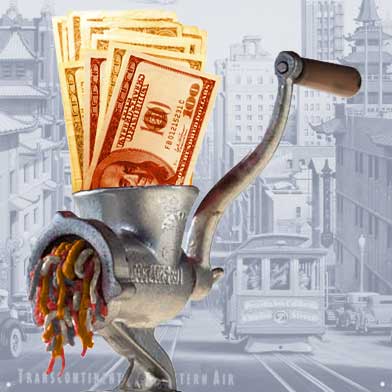 At a meeting of the Board of Supervisors Government Audit and Oversight Committee yesterday, board members assailed SFMTA brass after it was reported that the agency’s overtime budget this year will be significantly higher then originally projected. Muni expects to spend $18 million more on overtime than originally budgeted by the time this current fiscal year ends in June.
At a meeting of the Board of Supervisors Government Audit and Oversight Committee yesterday, board members assailed SFMTA brass after it was reported that the agency’s overtime budget this year will be significantly higher then originally projected. Muni expects to spend $18 million more on overtime than originally budgeted by the time this current fiscal year ends in June.
“This is a big deal,” said Supervisor Mark Farrell. “This is $18 million this year alone. That could do a world of good for the rest of our city.”
Of the 731,701 overtime hours worked by all city employees in the first nine months of the 2010-2011 fiscal year, nearly 60% were racked up by Muni operators.
For their part, SFMTA managers testified that the high level of overtime was unavoidable and if San Franciscans want a viable public transportation system, overtime is a bitter pill they’re going to have to swallow.
The extensive overtime worked by Muni operators is due to a number of factors. For one, the agency says they are unable to hire new drivers fast enough to meet demand after recent budget cuts. Not to mention that the raiding of SFMTA funds by Sacramento legislators in the last years of the Schwarzenegger administration necessitated a significant scaling back of Muni’s workforce.
Additionally, on any given day, 300 of the agency’s 1,500 operators are unavailable–the rate of unexplained absences has climbed as high as 15%.
Both of these factors, as well as a recent shortage of trained light rail operators, means that Muni has had to lean harder on the drivers it does have.
SFMTA management would like to hire more part-time workers to pick up the slack, however the agency’s contract with the operators union has strict prohibitions in place against taking on more part-time workers. The ability of SFMTA to hire more part-timers is one of the major sticking points the current round of contentious contact talks between SFMTA management and the union.
The committee chair, Supervisor David Campos, floated the idea of requiting city departments to obtain approval from the Board of Supervisors before exceeding their overtime budgets. “At the end of the day things are not going to change unless the board, working with the Mayor’s Office, forces that change,” Campos said.
Even though Muni’s overtime levels were higher than expected, agency officials defended their budget, saying that overtime costs are well within the overall amount they planned to spend on staffing.
This push against Muni’s overtime is part of a larger, city-wide effort to reign in overtime costs across all departments as a way to deal with the looming $829 million budget deficit the city faces over the next five years.
While overtime pay had been declining in recent years, this fiscal year has seen a dramatic increase of $12 million from last year. Supervisor David Chiu has suggested lowering the amount of hours a full time employee is allowed to work, making it impossible for them to accrue as much overtime as they had in the past.
Want more news, sent to your inbox every day? Then how about subscribing to our email newsletter? Here’s why we think you should. Come on, give it a try.









